The Second World Conference on Arts Education |
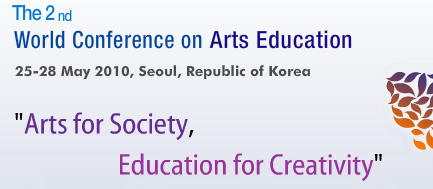
Seoul Agenda: Goals for the Development of Arts Education
Revised version 24 May 2010
|
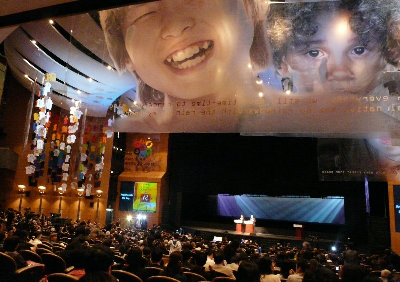
◆From the Road Map to Arts Education Development Goals
Drawn up on the basis of deliberations undertaken during the First World
Conference on Arts Educatlon (6-9 March 2006,Lisbon,Portugal),the“Road Map
for Arts Education”was produced and distributed to different countries encouraging its
implementation at national level.
The Road Map is especially designed to promote a common understanding among all
stakeholders of the essential role of arts education and to develop a consensus
on the importance of arts education by providing policy-guiding recommendations
implementing arts educatlon.
The impact and the effectiveness of the Road Map has since been verified
through the survey that was conducted by UNESCO on its implementation at
country level,whlch results will be presented at the Second World Conference
on Arts Education(25-28 May 2010, Seoul,Repubic of Korea).
The Second World Conference on Arts Education is ever committed to building
a foundation for renewed global discussions and critical perspectives on
arts education,outlining changes and opportunities needed for continously
evolving societies. ln order to respond to these concrete transformations
and requirements of current and future societies,arts education should first reflect on the main development
challenges it faces.
lf the Road Map has played its role in introducing a common ground of understanding
on arts education,consequent expectations from the international community
would be to have a solid plan, which communicates a clear vision to further
examine the state-of-the-art of arts education and to explore its prospective
challenges. The proposed Development Goals of/for Arts Education represent
such visionary aims,which are expected to serve as practical benchmarks
for future decisions and concrete strategies for actions in this field.
As the Second World Conference will not be a repetition of the FIrst,the
Development Goals will not be a duplication of the Road Map. However,as
opposed to denying the effects and the legacy of the Road Map,it will revitalize
the results that the Road Map has achieved in sharing its policy-guiding
objective and confirm its standpoint underlining the importance of arts
education for building a creative and culturally aware society.
At the same time,the Development Goals will,in recognizing the need to
assist all forces of society more actively in the common goal of building
balanced individuals and integrated societies,serve as a point of departure
to more concrete actions and as a reference to what long term development
objectives arts education should aim at. lt will primarily address to the
international community the significance of active engagement and serious
commitment to arts education development and, therefore,is presented as
an action-oriented document that mobilizes the arts education community
to plan the future and pursue action.
The Development Goals will be established as an agreed set of goals (during
the Second World Conference)after identifylng priorities for action,which
can be achieved through the global partnership and ongoing commitment of
the international arts education community. UNESCO will recommend to its
Member States as well as its partners and communities to accept the goals
when elaborating strategies and implementing quality arts education throughout
various environments.
The first version of the current paper providing the initial reflection
of these goals was drafted with reference to the discussions held during
the lnternational Advisory Committee(IAC)Meeting that took place in July
2009 at UNESCO Headquarters to prepare the Second World Conference. lt
was submitted to the members of the same Committee for further consultation.
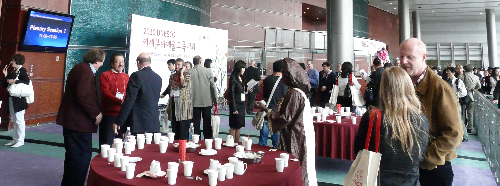
A second version taking into account the comments and proposals received
from the members of the lAC was finalized during a meeting on the 24th
of May 2010,with a view to being presented at the opening of the Conference
as a main tool for exchanges.
The starting point of consideration for the Development Goals corresponds
to the following issues that have been chiefly raised as global challenges
for the development of arts education:
− Inclusion
− Balance and Equity
− Networking
− Sustainability
− Cultural diversity
Along with such actions to bear in mind:
− Advocacy and policy support
− Partnership and Cooperation
− Capacity building Research and evaluation
Some general considerations encompassing the Goals were put forward by
the members and may constitute the main elements of a preamble:
- Define and promote arts education as the foundation of a new paradigm
of education
- Stress the importance of socio-cultural approaches and values
- Reintegrate the pedagogical and socio-economic importance of culture
- Encourage interdisciplinary practices in arts education
- Establish links between formal, informal and community education
- Articulate efforts from civil society,governments and high level training
institutions for reinforcing arts education
- Consider regional and local specificities
- Take into account creative and innovative technologies,a powerful advocacy
tool for arts education
As well as two concrete proposals:
- Establish international research networks to promote the sustainability
of arts education
- Elaborate an international guide for arts education advocacy
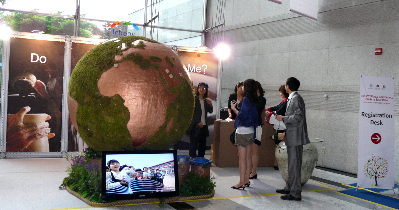
Finally, the following main lines are proposed for the Goals. They are
complemented with some targets as requested by the lAC members:
1. Affirm arts education as the foundation of a balanced cognitive, emotional,
aesthetic and social development of children and youth
Targets:
i)Give access to comprehensive and balanced studies in the arts to all
students at all levels of schooling as part of a broad education
ii)Include the creative qualities of arts experiences in lesson plans
iii)Develop systems of quality evaluation in order to ensure balanced
development
2. Strengthen arts education, including the experience of the arts and
collaboration with artists within and between in‐school and out‐of-school
education
Targets:
i)Treat arts at various school levels differently,for example arts as
self-expression,arts as a way to knowledge,arts as a discipline,etc.
Furthermore,develop arts education within schools in collaboration with
out-of-school training programmes and with the participation of artists.
ii)Develop skills and places for arts education outside schools in relation
to school activities
iii)Actively involve parents and communities
3. Empower teaching and artist communities with sustainable arts education
training
Targets:
i)Establish sustainable training mechanisms
ii)Integrate artistic language within pre-service teacher education and
the professional development of practicing teachers
iii)Develop systems of quality monitoring such as supervision and mentors
in order to ensure its implementation
4. Promote and foster lifelong learning in, about and through arts education
Targets:
i)Offer positive experiences and good lifelong relations to arts
ii)Promote lifelong learning of quality arts education to enhance the
cultural life of people
5. Recognize and develop the socio‐cultural well-being dimensions of arts
education
Targets:
i)Recognize the value of a full range of traditional and contemporary arts
experiences
ii)Integrate socio-cultural well-being into the various forms of arts
education training
iii)Cultivate the socio-cultural therapeutic and health dimensions of arts
education
6. Support and enhance the role of arts education in the promotion of
social responsibility, social cohesion, cultura diversity and intercultural
dialogue
Targets:
i) Prioritize the experience and inclusion of the learner-specific context
ii)Provide access to better knowledge and understanding of diverse cultural
and artistic expressions
iii)Develop multicultural arts education with the necessary support of
teacher training,pedagogy, equipment and teaching materials
7. Foster capabilities through arts education to respond to maior global
challenges, from peace to sustainability
Targets:
i)Increase mobility of students and teachers in encounters with different
cultures
ii)Enlarge global dimensions in the curriculum of arts education
iii)Reinforce the impact of the arts in quality education,in favor of democracy, global citizenship and cultural diversity
8. Build capacities for arts educatin leadership, advocacy and policy
development processes
Targets:
i)Build practitioners and researchers' capacities for arts education
advocacy and policy reform
ii)Develop the individual and social role of arts as ways of sensitization
and motivation
iii)Reinforce relations between the media and arts education and establish an
appropriate language for communication
9. Develop diverse arts education partnerships among various
stakeholders and sectors, from culture to industry
Targets:
i)Build partnerships within and beyond governments,educational and cultural sectors,communities and cultural industries that will
strengthen the role of arts education in society
ii)Coordinate the efforts of civil society organizations, governments
and higher education institutions to strengthen principles,policies and actions
of arts education
iii)Promote multilateral cooperation between education,culture and communication
sectors,notably through foundations and industries.
10. Stimulate dialogue and exchange between theory, research and practice in arts education
Targets:
i)Support arts research globally and link research and practice in arts
education
ii)Systemize and promote arts education practices through clearing houses
or bodies such as observatories
iii)Consolidate the quality of evidence of the impact of arts education
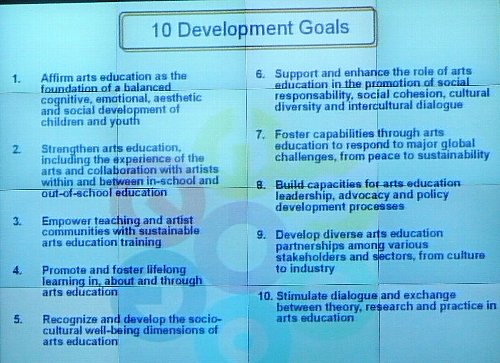
10 Development Goals in Seoul
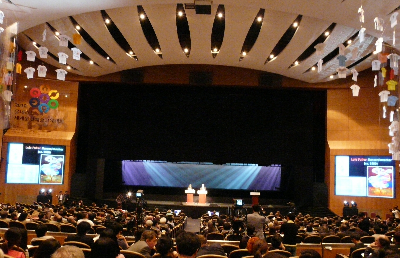
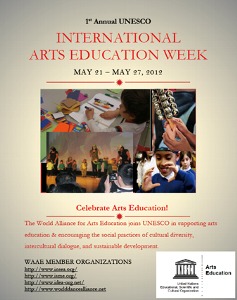 Following the success of the Second World Conference on Arts Education (Seoul, 2010), the UNESCO’s General Conference at its 36th session in 2011 proclaimed the 4th week of May as the International Arts Education Week. Following the success of the Second World Conference on Arts Education (Seoul, 2010), the UNESCO’s General Conference at its 36th session in 2011 proclaimed the 4th week of May as the International Arts Education Week.
The week of 21-27 May 2012 marks this year's International Arts Education Week.
|